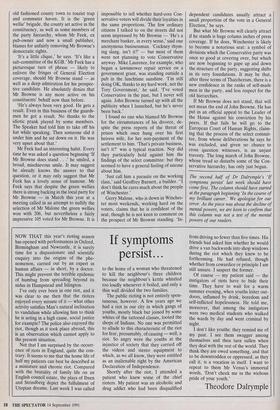If symptoms
persist...
NOW THAT this year's rioting season has opened with performances in Oxford, Birmingham and Newcastle, it is surely time for a dispassionate and scientific enquiry into the origins of the phe- nomenon, carried out by an expert in human affairs — in short, by a doctor. This might prevent the terrible epidemic of humbug from spreading beyond its nidus in Hampstead and Islington.
I've only ever been in one riot, and it was clear to me then that the rioters enjoyed every minute of it — what other activity satisfies Man's natural inclination to vandalism while allowing him to think he is acting in a high cause, social justice for example? The police also enjoyed the riot, though as it took place abroad, this is an observation which cannot apply to the present situation.
Not that I am surprised by the occurr- ence of riots in England, quite the con- trary. It seems to me that the home life of half my patients can best be described as a miniature and chronic riot. Compared with the brutality of family life on an English council estate, the plays of Ibsen and Strindberg depict the fulfulment of Utopian dreams. Last week I was called to the home of a woman who threatened to kill the neighbour's three children because the neighbour's kettle whistled too loudly whenever it boiled, and only a thin wall divided the two families.
The public rioting is not entirely spon- taneous, however. A few years ago we had a riot in our city in which gangs of youths, mostly black but jqined by some whites of the tattooed classes, looted the shops of Indians. No one was permitted to allude to this characteristic of the riot for fear, presumably, of causing — well, a riot. So angry were the youths at the injustice of society that they carried off the videos and stereo equipment to which, as we all know, they were entitled as an inalienable right by the American Declaration of Independence.
Shortly after the riot, I attended a patient who knew some of the chief rioters. My patient was an alcoholic and drug addict who had been disqualified from driving no fewer than five times. His friends had asked him whether he would drive a van backwards into shop windows during the riot which they knew to be forthcoming. He had refused, though whether from cowardice or principle I am still unsure. I suspect the former.
Of course — my patient said — the instigators of riots have to bide their time. They have to wait for a warm summer evening, when youths loiter out- doors, inflamed by drink, boredom and self-inflicted hopelessness. He told me, moreover, that among the instigators were two medical students who walked the wards by day and went criminal by night.
I don't like youths: they remind me of my past. I see them swagger among themselves and then turn sullen when they deal with the rest of the world. They think they are owed something, and that to be downtrodden or oppressed, as they call it, is a vocation in itself. I want to repeat to them Mr Venus's immortal words, 'Don't cheek me in the wichous pride of your youth.'
Theodore Dalrymple


















































 Previous page
Previous page